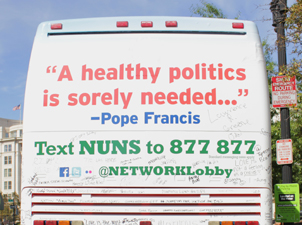
Gaps are Closing, but More Must Be Done to Create an Economy of Inclusion
By Lucas Allen
September 22, 2016
Nearly nine years after the start of the Great Recession, economic recovery has been painfully slow for many Americans and vast economic divides remain. However, promising new data released last week by the U.S. Census Bureau shows that 2015 was the best year of economic improvement for low- and middle-income Americans in decades. Here is some of the good news revealed in the report:
- The poverty rate fell by 1.2 percentage points, the steepest decline since 1968
- Real median household incomes rose by 5.2%, the largest increase since the 1960s
- The percentage of Americans who lack healthcare fell to 9.1%, the lowest uninsured rate in our nation’s history
Most importantly, these economic improvements were distributed to all Americans—not just the wealthiest. This Census report shows that in 2015, our country made some much-needed positive steps toward mending the gaps in our divided society. While these improvements are certainly promising, a closer look at the report shows that we have much more work to do to create an economy of inclusion. The shared growth of the past year is welcome news, but it has not changed the reality that far too many people are struggling to get by in the world’s richest nation. It is a grave injustice that women, children, and people of color continue to bear a disproportionate burden of this suffering. The poverty rates of women who head families (36.5%), children (19.7%), and African Americans (24.1%) are all far higher than the average poverty rate of 13.5%.
One cause for hope in this report is that federal programs are working to lift people out of situations of poverty—they just need to be ramped up. The improvements our country makes, and the gaps that persist, are greatly impacted by policies and decisions made by Congress. For example, the Earned-Income Tax Credit (EITC) and the Child Tax Credit (CTC) kept 9.2 million people out of poverty, and the Supplemental Nutrition Assistance Program (SNAP) kept 4.6 million people out of poverty. These large numbers are hard to picture, but they represent millions of families who are able to make ends meet with support from these programs.
In his address to Congress last year, Pope Francis said, “A political society endures when it seeks, as a vocation, to satisfy common needs by stimulating the growth of all its members, especially those in situations of greater vulnerability or risk. Legislative activity is always based on care for the people.” Programs such as the EITC, CTC, and SNAP are great examples of legislation based on care for people and the common good. If you and I make our voices heard this election season, we can ensure that programs like these are protected and expanded to create an inclusive economy and society.
More resources:
https://networklobby.org/election2016/sidebysides/
https://networklobby.org/election2016/
https://www.census.gov/library/publications/2016/demo/p60-256.html







